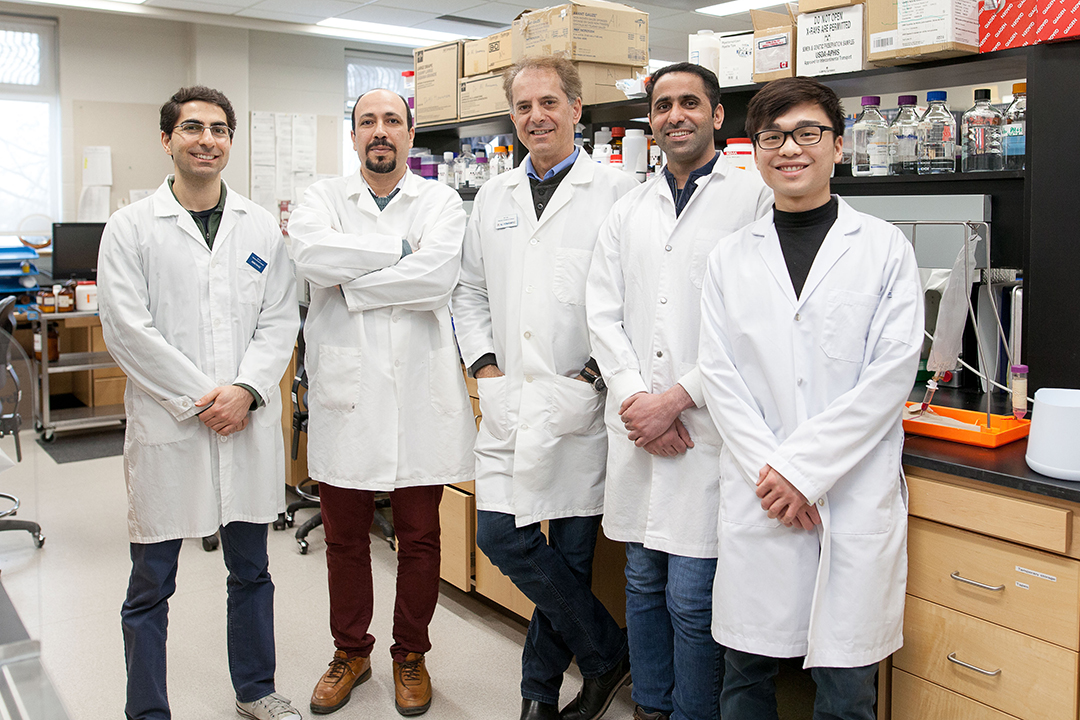
Cham receives USask Graduate Thesis Award for male reproduction research
Dr. Tat-Chuan Cham, a graduate student at the Western College of Veterinary Medicine (WCVM), has received a University of Saskatchewan (USask) Graduate Thesis Award for his master’s thesis on male reproduction.
By Jessica Colby“This award is a huge recognition for my work and ability as a researcher and a scientist,” says Cham, who is originally from Johor Bahru, Malaysia. “Experiments can be frustrating sometimes, but this award encourages me to keep working, never give up and be confident in myself.”
Cham’s Master of Science (MSc) thesis focuses on growing artificial porcine testis tissue in vitro. The process has been successfully completed in rodents but remains challenging in larger, non-rodent species such as pigs.
“[The piglet testis is] the most similar artificial testis tissue that anyone has made for a non-rodent species,” says Dr. Ali Honaramooz, Cham’s supervisor and a professor in the WCVM Department of Veterinary Biomedical Sciences. “And that’s exactly what he [Cham] wrote a review paper based on and said that’s an area that needs to be developed and that’s what he did.”
Honaramooz adds that to date, there is no other known report on the appearance of blood vessels in any organoid (a simplified version of an organ produced in vitro), whether that is a testis, kidney or any other organ.
Before finishing his master’s thesis, Cham wrote and published a review paper on this topic. “Current progress, challenges and future prospects of testis organoids” was selected as “Editor’s Choice” in the May 2021 issue of Biology of Reproduction, one of the top peer-reviewed journals in the field.
“[The award is] a recognition that Tat’s research goes beyond being a good thesis within our lab, department or college; it can be competitive among all master’s theses in life sciences.” says Honaramooz.
Each spring, the USask College of Graduate and Postdoctoral Studies (CGPS) presents 10 Graduate Thesis Awards to master’s and PhD students in five different disciplines: humanities and fine arts, life sciences, physical and engineering sciences and two categories of social sciences.
The CGPS awards are open to all students graduating with master’s or PhD degrees in the spring or preceding fall semester. Each recipient receives a $500 prize offered by the CGPS and the USask Office of the Vice-President Academic.
“When he [Cham] joined my lab, he chose a challenging subject but he used his intellectual gifts and continued to work really diligently to produce results that were beyond our wildest imagination,” says Honaramooz. “So, when the subject came up for nominating him, his thesis examining committee was unanimous that we should put his name forward for this award and that’s what we did.”
Honaramooz adds that Cham had to take classes in biomedical engineering so he could better understand the creation of artificial tissues.
“I am a great fan of science and biotechnology,” says Cham, who completed his Doctor of Veterinary Medicine (DVM) degree in Taiwan before coming to the WCVM. “As a vet, I am particularly interested in using innovative biotechnology to study disease mechanisms and improve the health of animals, humans and our environment.”
In Cham’s research, he used piglet testis cells which were made to reassemble into testis organoids over a four-week period. The organoids that resulted have testis structures and endocrine functionality. This includes the presence of major cell types, structures, and secretion of testosterone.
“This is an exciting finding because this system can be further utilized in a number of potential applications,” says Cham.
Cham won his thesis award for the university’s life sciences discipline, which includes agriculture, biology, chemistry, pharmacy and toxicology.
“It felt unreal and unbelievable when I received the email from CGPS about me winning the award,” says Cham. “It took me several minutes to realize that I had actually won the award, and I feel very grateful and lucky.”
Cham will continue his studies in Honaramooz’s lab at the WCVM. His next research challenge is his PhD project that will explore toxicopathology testing using the already-developed in vitro porcine testis organoids.
“I’m sure he is going to move on to do great things in his career,” says Honaramooz.
Jessica Colby of Montmartre, Sask., is a fourth-year student in the University of Regina’s School of Journalism. She worked as a research communications intern at the Western College of Veterinary Medicine (WCVM) for summer 2021.

